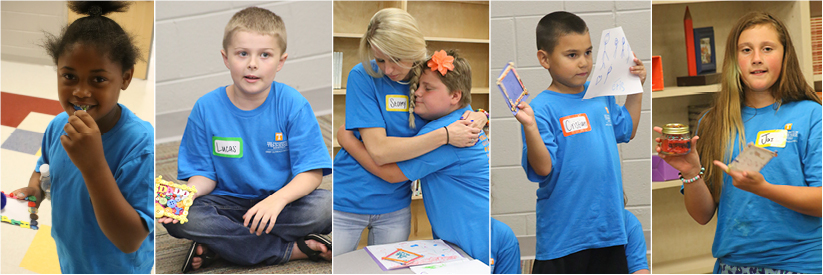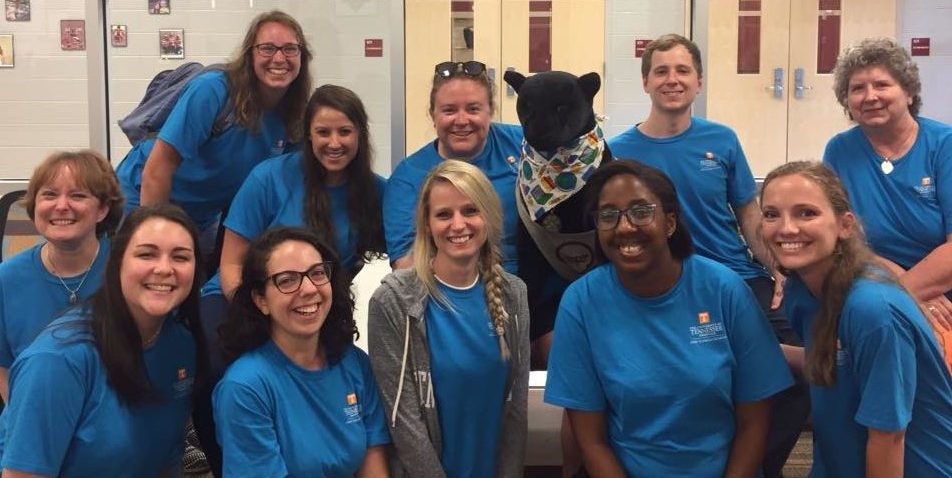This was the inaugural year for Grief Outreach Initiative’s (GOI) Camp Aliya. The camp was named after the little girl who started it all – the child Dean Rider read to one year around Mother’s Day. Her mother had died, and Dean Rider was so struck by her and by the needs of children, especially in Title I schools who might need help with grief, but couldn’t access mental health services. This inspired him to create GOI in 2008. Laura Wheat, assistant professor, became the coordinator of GOI in 2014.
At Camp Aliya, children spent their time in small and large groups, outside, and being involved in music, arts, and crafts. Here are some of their activities:
- They constructed and guided each other through obstacle courses made of yarn, relating the difficulties of the course to the grieving process and discussing the role of others in helping you get through the process.
- Campers played sorting games to distinguish between helpful and unhelpful coping behaviors.
- They had the opportunity to depict their story of grief however they wanted. Some children wrote stories, other drew pictures, then if they were comfortable they shared them with the group.
- The children made body drawings in chalk to label different feelings they have related to their grief.
- Campers wrote down things they felt afraid to share on pieces of paper, crumbled them into balls, and threw them back and forth. They talked about what it was like for others to physically hold our fears and troubles. After they were comfortable, everyone anonymously opened one of the balled up fears to read allowed, and they found that many of the fears were similar, despite different stories.
Wheat ran Camp Aliya with 10 other staff members comprised who are current students, recent alumni, and/or community members. Wheat explained, “We intentionally kept the camp small and time-limited this year to make sure we knew what we were doing! I hope very much to secure grant funding to keep it going annually and expand from elementary-age kids to any school-age kid. I also hope that in the future we can develop and implement a trauma-focused therapeutic element as well, perhaps based on Allison Salloum’s work (Grief and Trauma in Children: An Evidence-Based Treatment Manual).”
“I am so thankful to be in a place that is supportive of programming that focuses on child and adolescent grief. It still feels a little bit magical to me, even four years later, that I get to do this work.”
When asked how it felt to to initiate and complete Camp Aliya, Wheat said the following: “It felt AMAZING!! It was a really daunting task, and it felt at times like climbing a mountain. But I was lucky to have Jillian Blueford, Counselor Education student, who was a huge help. She and I designed and implemented the whole thing together, so seeing it run those two days was incredible. We had the best, most energetic, creative, and heart-filled staff, and such great care from the folks at Pond Gap. I took some of the staff out for celebratory apps at Fieldhouse Social afterwards to thank them for their commitment and enthusiasm. However small it was with only 11 campers, I know we put some good in the world, and that’s what matters most to me. I could see some of the campers really benefiting. I even heard an anecdote via Jillian the other day, who reported that one of the campers’ caregivers had told her that he still wears the support bracelet he made at camp and talks about it all the time.”
To see photos from the inaugural Camp Aliya, check out the EPC Facebook page! Also, keep an eye out for the next edition of Accolades for an in-depth story about Camp Aliya.

